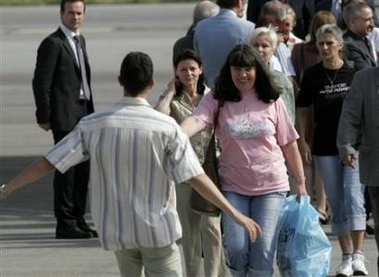HIV medics freed after Libya-EU deal
(AP)Updated: 2007-07-24 20:09
SOFIA - Six foreign medics convicted of infecting Libyan children with HIV were freed on Tuesday after a "full partnership" deal between Tripoli and the European Union ended their eight-year ordeal.
 Bulgarian nurse Valia Cherveniashka (in pink shirt), one of the Bulgarian nurses convicted of infecting Libyan children with HIV, is welcomed by a relative after their arrival at Sofia airport July 24, 2007. [Reuters] |
Their return to Bulgaria ends what Libya's critics called a human rights scandal and lifts a barrier to attempts by the long-isolated north African state to complete a process of normalizing ties with the West.
Bulgarian President Georgi Parvanov pardoned the five nurses and a Palestinian doctor who recently took Bulgarian citizenship after their arrival in Sofia on a French jet. The medics said they were innocent and had been tortured to confess.
"I know I am free, I know I am on Bulgarian land, but I still cannot believe it," 48-year-old nurse Christiana Valcheva said as the medics and their families wept and hugged each other at the airport.
"They woke us up at 4 am and at 5.45 we left the gate of the prison and boarded the French plane. I am in such a state that I still cannot feel anything."
The Bulgarian nurses were flown to Sofia after the EU, which Bulgaria joined in January, agreed a last-minute breakthrough deal with Libya on medical aid and political ties.
"We hope to go on further normalizing our relations with Libya. Our relations with Libya were in a large extent blocked by the non-settlement of this medics issue," EU Commission President Jose Manuel Barroso said.
Libyan Foreign Minister Mohammed Abdel-Rahman Shalgam said the deal had opened the way to "full cooperation and partnership between Libya and the European Union."
Bulgaria and its allies in Brussels and Washington had suggested that not freeing the nurses would hurt Libya's efforts to emerge from decades of diplomatic isolation imposed for what the West called its support of terrorism.
Deal On Ties
EU External Relations Commissioner Benita Ferrero-Waldner traveled to Tripoli with Cecilia Sarkozy, the wife of the French president, to help free the medics and flew with them to Sofia. She signed a two-page deal with Libya, laying out how ties could be boosted, a European source said.
"It covers everything -- trade, support for archaeology, illegal immigration, grants for students and visa questions," the European source said.
The EU also agreed to help upgrade a hospital in Benghazi, Libya's second city where the infections first appeared in the 1990s.
Nineteen Bulgarian medical workers were initially detained in 1999 and six stood trial. One Bulgarian doctor was released in May 2004 when the five nurses and the Palestinian doctor were sentenced to death.
Foreign HIV experts testified that the infections started before the six found guilty arrived at the hospital, and were more likely to be the result of poor hygiene.
The victims' families have said the case was part of a Western attempt to undermine Muslims in Libya. Fifty-six of the children have died.
Claude Gueant, chief of staff of French President Nicolas Sarkozy, said he had been unsure about whether the nurses would actually be released until the last minute.
"Right up to the arrival of the nurses at the airport at Tripoli this morning, around 6 am, we had doubts. Right up until the end we had doubts," said Gueant.
Sarkozy had pledged to make the medics' release a foreign policy priority and said he would visit Libya on Wednesday to help Tripoli's reintegration with the West.
Qatar Mediatation
The French presidency and the EU commission also thanked Qatar for its mediation.
Neither France nor the EU had made any payment to Libya to ensure the nurses' release, Sarkozy said. Barroso said the Emir of Qatar had pledged more humanitarian aid.
Last week Libya commuted the death sentences against the six to life imprisonment following the payment of hundreds of millions of dollars to the families of 460 HIV victims.
That paved the way for the medics to return home under a 1984 prisoner exchange agreement.
The medics, who looked in good health, and their families will stay for the next few days in the presidential residency on the outskirts of Sofia where they will undergo medical checks.
The nurses left the relatively poor Balkan country of 7.8 million people in the late 1990s to work in Libya, where health care salaries were much higher.
Libya emerged from decades of isolation in 2003 when it scrapped a program of prohibited weapons and returned to international mainstream politics.
The country has begun opening its big energy reserves to foreign oil firms and the United States said this month it was sending its first ambassador to Tripoli in 35 years.
|
||
|
||
|
|
|
|